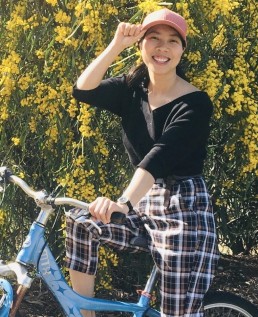PhD student on the hunt for mycoparasites
 Dan originally studied and worked in the area of plant protection in Vietnam before moving to Australia to complete her Master’s degree in Biotechnology at Flinders University in South Australia.
Dan originally studied and worked in the area of plant protection in Vietnam before moving to Australia to complete her Master’s degree in Biotechnology at Flinders University in South Australia.
“My Master’s study was about the identification of the molecular markers linked to multiple rust resistance traits in wheat,” says Dan. “Identifying the markers that help in the selection of disease resistant plants is really useful for plant breeding programs.”
After finishing her Master’s, Dan wanted to learn more about how to control plant diseases using environmentally friendly approaches. This includes selective breeding using molecular markers, but it also includes non-chemical biological controls.
“I think that biocontrols are often the best option for managing disease in native areas,” says Dan.
When Dan heard about a PhD project at Lincoln University for finding biocontrols for myrtle rust in New Zealand, she jumped at the opportunity. Her research will involve conducting field surveys in the North Island and the South Island in the spring and summer time where she will look for the fungal communities living on the leaves and in the leaf tissue of our native Myrtaceae.
Dan is particularly enthralled by the idea of finding mycoparasites. Mycoparasites are fungi that use a different species of fungi as a source of nutrients. A mycoparasite has recently been found on myrtle rust by researchers at Scion (see story here) and while Dan will collaborate with them to investigate that organism further, she is looking forward to hunting for additional species.
“I was so astonished that fungi could be used to control a fungal pathogen,” she says. “Hopefully I do find some of them. Fungi are so diverse that I’m not sure what I’m going to find.”
She will bring whatever fungi she finds back to the lab, identify them using molecular techniques, evaluate their biocontrol potential and then also try to determine the mechanisms behind how they work, especially the mechanisms behind mycoparasitism.
“I’d also like to answer the question about the origin of the fungi I find. Where are they from? Are they specific to Myrtaceous plants only or can they also be found on surrounding plants?”
It is still early days for Dan and her research. She was expected to start last year, but was delayed due to COVID. She finally made it to New Zealand earlier this year and started her studies in June. She is now in the process of finalizing her research proposal. Welcome Dan, and we look forward to getting excited about whatever fungi you find out in the field!
Dan is being supervised by Eirian Jones (Lincoln University), Hayley Ridgway (Plant & Food Research) and Soonie Chng (Plant & Food Research).